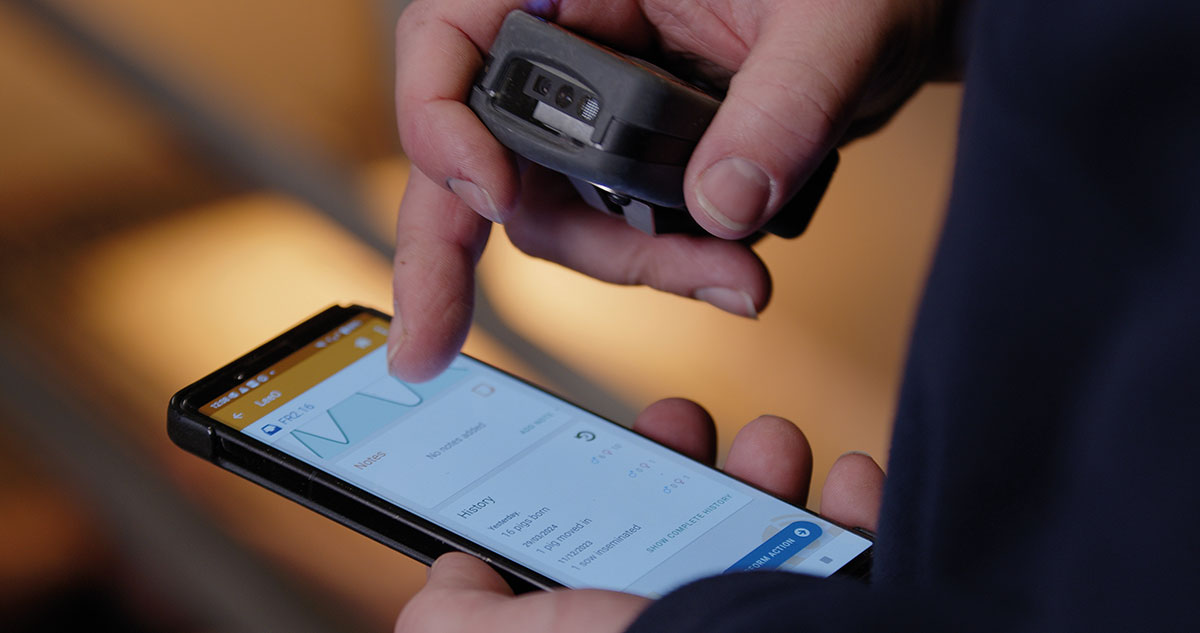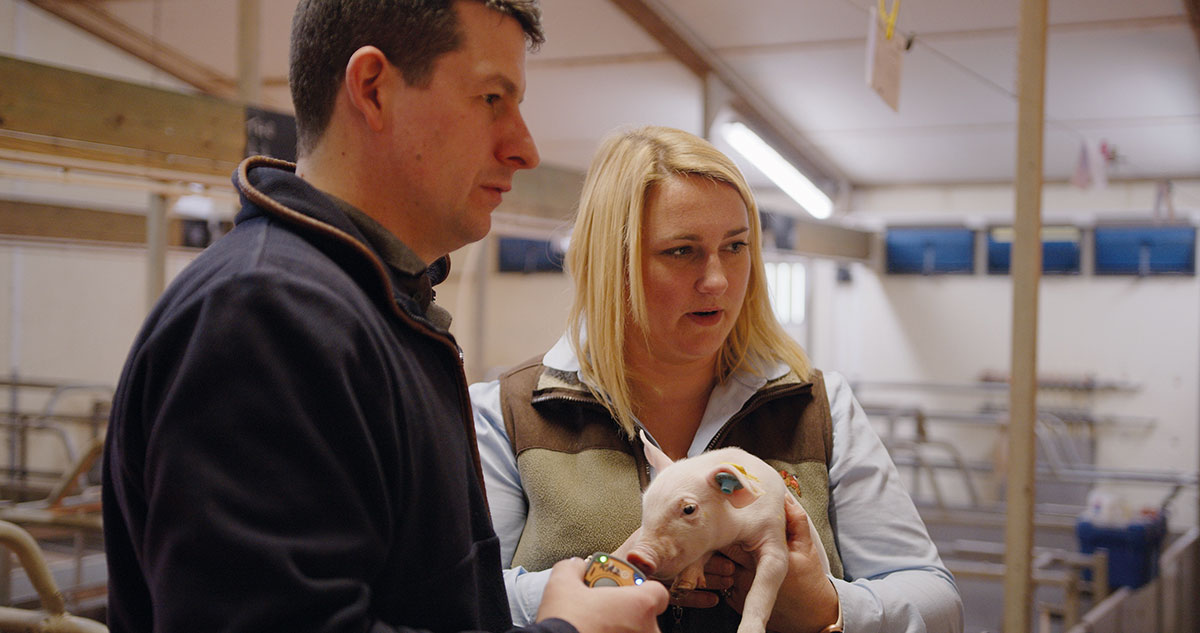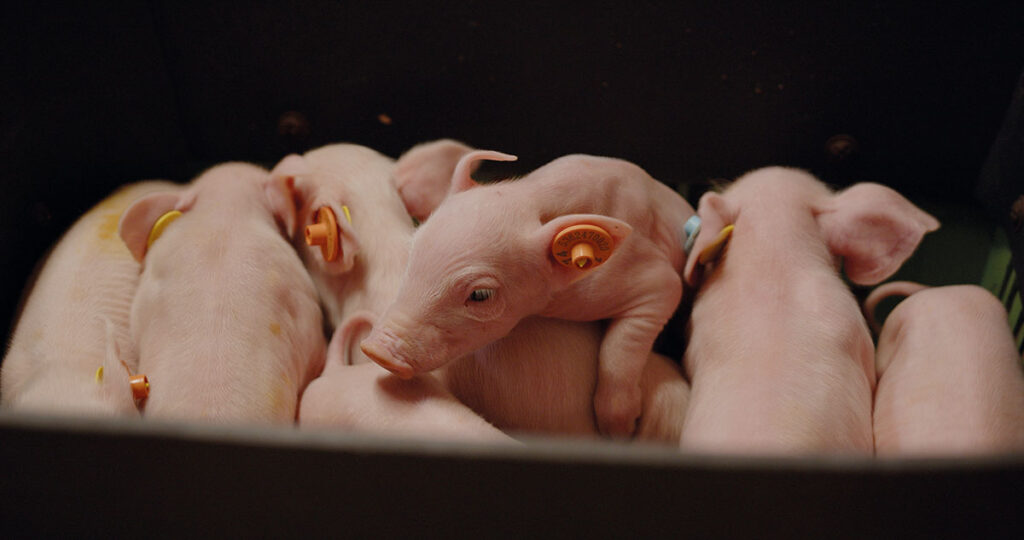In the heart of North Yorkshire, third-generation pig farmer Joe Wilson is pioneering the use of innovative technology on his 750-sow breeding unit.
By integrating advanced piglet and sow tracking systems, he has seen improvements in the overall performance of his herd.
Mr Wilson is the first farmer in the UK to trial LeeO Precision Farming, a piglet and sow ear tagging system that allows farmers to register, monitor and track each individual pig from birth to slaughter.
MSD Animal Health’s cloud-based LeeO tracking and monitoring solution works with ear tags, readers, scales and a mobile device to capture the key lifecycle events of individual pigs, so farmers can connect and evaluate all stages of the production cycle – from farrow to finish.
Farm facts
- Based in Yorkshire
- 750-sow indoor unit
- 34 farrowings a week
- Criss-cross breeding system
- Producing own gilts since 2001
- Growth from birth to transfer: 510g/day
Mr Wilson explained that with a production system of 34 farrowings a week, his farm is focused on driving efficiency, health and welfare through the adoption of new technologies.
“Ultimately, we want to be seen as a modern pig business,” he said.
Having installed the system in March 2024, he is using the precision technology to record information across the unit, from conception rates, birthweights and days to slaughter, through to piglet movements and any interventions that are required.
“Data is collected from the moment a piglet is tagged, which allows me to make real-time and data-backed management decisions on breeding, health and welfare.
This helps me to improve the long-term financial, environmental and sustainability performance of the herd,” he added.
“Precision farming is changing how we think about our production system. By tagging every pig, we can get to the nitty-gritty of efficiencies, which is key to adding value at every point in the pig’s life.”
Embracing technology
Mr Wilson emphasised the importance of nutrition, regular health checks and maintaining a clean environment for the health and wellbeing of his herd.
“The success of our farrowing system is a testament to our meticulous approach. From ensuring the sows are comfortable, to monitoring piglets’ health right after birth, we leave no stone unturned,” he said.
“Tracking each piglet’s birthweight and progress until weaning is a critical part of this process. We have a structured system to manage the farrowing process, ensuring that piglets get the best start in life.
“By focusing on monitoring birthweights and daily liveweight gain, we can spot the piglets that need more support earlier and give them the attention they need.

“The introduction of LeeO has significantly helped us in tracking and managing these details and the data, making the process more efficient and effective.
“By being able to closely monitor the health and performance of each sow and her litter, we can make any decisions needed to ensure our herd remains productive and healthy.”
He identified one notable insight as the ability to adjust sow feeding regimes to boost piglet health and growth rates where the data shows birthweights and growth rates are below average, using the data to identify this before it is visible to the eye.
“Just last month, we increased the volume of feed per sow before farrowing, which has stabilised piglet birthweights. This change saw birthweights average 1.4kg, which has led to better health outcomes and more streamlined piglet management,” he said.
“We can influence growth and the time it takes us to get pigs to slaughter and make instant breeding decisions using data to identify the best-performing sows, pairing them with our best boars.
“It also gives us traceability across the whole of a pig’s life and environment exposure, from day one. This allows us to identify common ailments and diseases sooner, and follow a sow’s progeny right through to understand if their ailments are heritable or environmentally avoidable.”
Identify poor performance
Not only are all the sows and piglets tagged, each individual pen and farrowing pen have been assigned tags, allowing Mr Wilson to identify poor-performing pens or even areas within a room. Breeding decisions can then be made to reduce incidents of scour, lameness or even help breed out genetic disease completely, for example.
Having recognised the potential of LeeO through his industry connections, Mr Wilson was intrigued by the possibility to streamline operations and improve data accuracy.
Implementing this technology was a strategic move to modernise his farm and maintain a competitive edge in the industry. “LeeO’s technology integrates seamlessly with our existing systems,” he said.
This integration has not only improved efficiency, but also reduced the need for manual data entry.
“The ease of use and the insights it can provide allows us to make informed management decisions and increase farm efficiencies, where necessary,” Mr Wilson added.
He pointed out that the pig industry isn’t always considered to be as technologically advanced as it is in reality.
“Obviously, there are some elements of scepticism about extra work, such as tagging pigs from day one, when it comes to embracing technology,” he added.
“But it is quite reassuring to tell other producers that once you’ve found your flow and integrated it into your system, it really doesn’t take any extra time at all, and the payback is worth it.
“Once you have all the information you get out of it, it’s more than worth the bit of extra time tagging piglets – you can’t beat having accurate data and information at your fingertips on your phone. It’s important for us to stay ahead with technology, and LeeO really falls into that category.”
Assurance beyond farm gate
The traceability provided by this technology extends beyond the farm gate, offering assurance to the supply chain and consumers.
It ensures that each pig’s journey is documented, building trust and transparency, while consumers can be confident about the quality of the pork they purchase, and supply chain partners benefit from reliable, verified data straight from the farm, according to Ingrid Potter, key account manager at MSD Animal Health UK.
She explained why individual health and performance tracking provides the opportunity for producers and integrators to gain a better understanding of the health and welfare status of all pigs under their management.
“Unlike other systems, it offers real-time data collection and a user-friendly dashboard tailored to the farmer’s KPIs, allowing for precise management and better decision-making,” she said.

“The technology enhances traceability and transparency from farm to fork, which is increasingly important to consumers and supply chain partners. It saves time by streamlining data collection and management processes, ultimately improving efficiency and productivity.”
Mrs Potter also highlighted that with full adoption at the abattoir and processor level, farmers would also have visibility and feedback of meat yield and carcase quality, which could be used to enhance and refine their nutrition strategies, saving money and wastage.
“LeeO takes the guesswork out of herd management and allows farmers to create the fastest-growing and healthiest pigs,” she said.
“The supply chain must see the value and offer a higher price per kilo for a
tagged pig, which comes with a whole host of data.”




